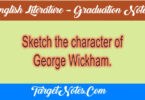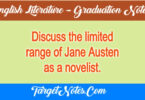
Contents
Describe Dickens as a typical Victorian novelist.
Or
According to D.E. “Dickens is not only the most famous of the Victorian novelists, he is also the most typical” (David Cecil). Evaluate.
Dickens is a representative of the virtues and vices of the Victorian novel. He possesses limitations of the Victorian novel. His novels contain the device of mistaken identity, long-lost heirs, and the other attributes of romance. There is much of false sentiment, false melodrama, lifeless characters in his novels. The plots are not organic wholes. Dickens plots’s are conventional, generally highly improbable, and many of his incidents and characters we superfluous. The novels are full of melodrama, which provide us with a thrill, a sensation, and lack in genuine emotions of pity and terror.
His pathos is generally over-done. He tries to extract an extra tear from the situation. He is a failure when we consider his characters. His serious characters, with the exception of David, are the traditional virtueous and vicious figures a melodrama. The good character are absolutely good and the bad are entirely bad without any redeeming feature. The Victorian novel has various limitations of subject matter also. Principal aspect of life are ignored. The physical side of human nature is not treated in detail. The view of life expressed is top sided and partial. There is no delineation of sex. Characters are not pre-occupied with religion, sex, politics, and philosophical discussions. The subject matter of the Victorian novel is restricted resulting in limiting the range of characterisation. These limitations of the Victorian novel are compensated by his merits which are mentioned below. They narrate the story well. The whole of the society comes to be introduced in them. The range of mood is equally large. They write for all time. They bring realism and fantasy, thrills and theories at one place. Dickens possesses a fantastic imagination. Individual oddities and peculiarties are stressed to the extent of exaggeration. His imagination is excited and begins to work when he sees anything grotesque.
The Victorian novels are more or less like pictures. They may adhere to the facts of life, but the facts are not merely reproduced but fired and coloured by the creative imagination of the writer. Humour is by its nature creative and his novels excel in humour. They are not a mere record of facts, but a comment on views. Dickens is one of the greatest humorist in English literature. He is the maker of humourous characters of fun. Mr. Micawber, uncle pumblechook and others are comic figures. The characters are extremely alive. They are men and women of flesh and blood. They are real, breathing and living human beings. They are unforgettable. Charles Dickens represents in his world the various virtues and vices of the Victorian novel. In his novels also there is mistaken identity, long lost heirs and the other paraphernalia of romance. There is hardly a book of Dickens in which there is not false sentiment, false melodrama, wooden characters, etc. The novels are full of melodrama which only gives us thrill, a sensation, and does not arouse the emotions of pity and terror. His pathos is generally overdone. “Dickens not only underlines the pathos in the situation, he tries to increase it by the addition of foreign elements.” He falls over his characters. His serious characters are the conventional virtuous and vicious figures of melodrama.
Dickens suffers from all limitations of Victorian novel. There is no free and frank discussion of sex. Religion, politics and philosophical discussion are rarely brought in, and then too as objects of ridicule. Dickens’ range is a limited one. He fails to draw an intellectual successfully, and he is no good at a gentleman. Dickens is good at comedy but this pathos is over done and degenerates into sentimentality. He is incapable of real tragedy. Dickens grips the attention of the readers with the first sentence. He is one of the greatest entertainers in the English language. Dickens had a fantastic imagination. He exaggerated individual oddities and peculiarities. Anything grotesque would excite his imagination and set it working. ‘Dickens’ world is, therefore, not life-like, but it is extraordinary alive. This is so because he was exceptionally gifted with creative imagination.
Dickens has used the real world to create his own world. As Hugh Walker points out, he is the romancer of London life, and his romance is founded on reality. Dickens’ London is hazed with fogs, lurid with gaslight, with its shabby clamorous cheerless streets, its cousy and its squalid interiors, its stagnant water-side. Dickens is one of the greatest humorists in the English language. He has created countless figures of fun.
Related Link
- Write a short note on narrative technique of a novel.
- What do you understand by Novel? What are the elements which are to considered in plot construction.
- Define Growth of Post-colonial Literature: Feminism, Post-Modernism & Important Facts
- Define The Poetic Drama & Important Facts
- What is Epic Theatre & its Important Facts?
- What is The Expressionism & Important Facts to Remember?
- What is the Theatre of the Absurd & Important Facts
- Define Drama of Ideas & Important Facts.
- Define The Problem Play & Important Facts.
Disclaimer






